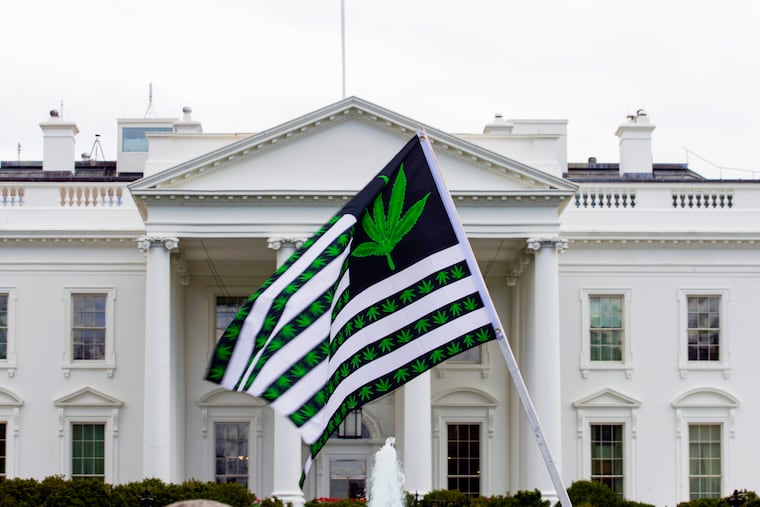Biden’s attempt to overhaul marijuana laws just doesn’t go far enough
The president's order failed to free those incarcerated for drug charges, among other missed opportunities. Now is a moment to craft legislation that will right past wrongs and promote equity in Pa.

Let’s be real: President Joe Biden’s announcement that he was pardoning federal convictions for simple marijuana possession felt more like virtue signaling than a genuine change of heart — especially after he spent most of his political career aiding and abetting the war on drugs.
Presumably well intended, Biden’s actions just don’t go far enough. His order fails to free those incarcerated for marijuana charges, provide adequate resources for their reentry into society, or recognize the impact that incarceration has had on marginalized communities.
Now that there is attention on marijuana at the national level, we must encourage statewide legislation that will right the wrongs of drug laws that are rooted in the vestiges of Jim Crow. Doing so will prioritize social equity opportunities for farmers and entrepreneurs, and prevent corporate monopolies from depriving Pennsylvanians of the benefits of a thriving rural-urban cannabis economy.
This is an opportunity, if not a social justice imperative, for Pennsylvania’s legislature to dismantle the prison pipeline and enact restorative justice policies that invest in the communities that have been ground zero for the drug war. The authorities need to expunge records and restrict future arrests to more serious crimes to minimize the collateral consequences of prior marijuana convictions.
» READ MORE: Could 2023 be the year of legal weed in Pennsylvania? Maybe, but don’t count on it.
Thirty-seven state legislatures — which have legalized cannabis either as a medicinal remedy, approved its use by adults, or both — have taken up the gauntlet, but Pennsylvania is lagging on its moral responsibility to address the multigenerational trauma of disenfranchised communities. That task lies squarely at the feet of our representatives and senators.
Marijuana remains illegal in the commonwealth, although New Jersey and New York have approved recreational use and two other neighboring states — Maryland and Ohio — are poised to consider legalization in the coming months. Experts in cannabis law speculate that Harrisburg could consider legalization in Pennsylvania as soon as next year.
With a projected $2.5 billion in cannabis industry revenue statewide if legalization occurs, Pennsylvania is well-positioned to reap a financial windfall. But if legislators are looking at legalization solely as a tool to chase the profits that are leaking across our borders to neighboring states like New Jersey, we will miss a distinctive opportunity to right the wrongs of the past.
The drug war has had the most damaging impact on Black and brown communities in the form of 50 years of excessively punitive anti-drug legislation, mass incarceration, and militarization of local police forces.
In 2020 alone, there were 20,200 arrests for marijuana possession. A record of conviction has lifelong social and economic impacts, leading to instability in employment and housing. Incarceration as well as services for housing and food insecurity are costly to taxpayers.
» READ MORE: What to know about Pennsylvania’s marijuana laws
In order to make amends for decades of societal harm, Pennsylvania must establish a cannabis regulatory framework that distributes the tax revenue from marijuana sales back to the communities devastated by the drug war. That means establishing social equity programs that provide grants, education, and support for disenfranchised entrepreneurs and disadvantaged farmers.
We have an opportunity to create programs to unite rural farms and urban businesses, which would create an economic boon for local economies through job creation. It is also important that legislators enact protections that will keep small farmers from being elbowed out of the market.
Adult-use cannabis legislation that incorporates social and economic equity policies must also reach across party lines and have a broad base of support. Local small farmers and small-business owners need to build a supply chain that builds upon the experience of the legacy markets without the stigma previously attached by criminalization.
State legislators should be careful to prevent economic concentration and multistate domination of cannabis markets. Marijuana revenue must stay in our state.
Tara M. Zrinski is the campaign director of Pot Profits for Pennsylvanians, an effort of All Together Now Pennsylvania. Cherron Perry-Thomas is director of social impact for the Diasporic Alliance for Cannabis Opportunities and the founder of Black Cannabis Week.